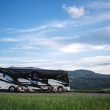Roughly 1 million Americans are living in RVs full-time, according to the Washington Post. The pull of living as a modern-day nomad has taken hold all over the US. Those who chose full-time RVing may warn you that it isn’t always easy, but it’s definitely plenty of fun. If you’re considering living in an RV, we’ll go over some of the pros and cons. Then, we’ll discuss some important questions to ask yourself when choosing a unit to become your new home on the road.
Pros of Full-Time RVing
Arguably the main reason why people choose to ditch their homes for a life on the road is the freedom. You can choose to live anywhere and move at any time. Don’t like the weather? Don’t like the town? No problem! You just hitch your home on wheels to the back of the pickup and head for sunnier skies and greener grasses.
Full-time RVing also requires you to let go of material things and focus on your experiences. When your whole life has to fit in 200 square feet, you have to make tough decisions about what’s important. There isn’t enough space to be attached to material things. Instead, your life becomes about the places you go and experiences you have. More of your time is spent adventuring in nature, and less time is spent waiting for your next Amazon package.
The last major pro we’re going to discuss is the unpredictability. There’s no telling where you’ll end up and what’s going to happen when you get there. Dealing with constant surprises keeps life interesting and helps you grow into a more relaxed person.
Cons of Full-Time RVing
Full-time RV living can be plenty of fun, but some sacrifices are difficult to make. Always being on the move can create a sort of isolation, even for those feeling very close to their travel partner. You don’t have consistent neighbors, favorite restaurants, local friends or any sense of permanent community.
Along with personal connection, internet connection can be a major issue. With no outlets connecting your home to the internet, Wi-Fi access can be difficult. Full-time RVing often means working from home, so internet connection is essential. You have to depend on mobile routers and constant cell phone reception. It can be difficult to depend on such unreliable sources for internet, especially as it has grown to be essential in every household.
Unpredictability can be great, but it can also be a major source of stress. Never knowing what to expect is difficult, and planning ahead is nearly impossible. Humans are creatures of habit, so lacking any real routine can be challenging.
Choosing a Unit for Full-Time RVing
Once you’ve decided full-time RVing is the path for you, it’s time to choose the camper that will become your new home. You should consider where you plan to spend most of your time, what weather conditions you expect to encounter, how much you plan to spend and how much space you’ll need.
Public Parking Restrictions
The first consideration when choosing an apartment on wheels is where you plan to be parked most of the time. If you plan to mainly live in public RV parks, the size of your unit will be important. Most RV parks, both privately and government-owned, have rules about the campers they allow. These campgrounds often have length restrictions on units, and if larger spots are available there’s usually only a few. Consider buying a unit less than 35 feet long.
Climate Preferences
Sure, most people who choose to travel full-time want to head south during winter months. But, unless you’ve reserved your parking spot in Florida for the whole winter, you’ll likely run into ice and snow. You might even decide to head up north to hit the slopes in Colorado or ice skate in Pennsylvania for some wintertime fun. Unless you plan to strictly stay away from the snow and ice, choose a unit that can handle all four seasons. Make sure your unit is well-insulated against cold weather to keep you warm all winter long.
Consider the Costs
Plan how much you’d like to spend before you choose a unit. Motorhomes come at a higher price point than towable trailers. But you can’t tow a travel trailer without a large vehicle. If you choose travel trailer but don’t have a car rated to tow it, consider the cost of purchasing a new car.
Space
If you’re new to living life on the road, it can be difficult to know how much space you’ll need. The main concern is underestimating how much room you need when purchasing a new unit. If you plan to travel with children, consider how much space they’ll need as well. Even pets take up a good amount of space. You might want to choose a smaller unit that costs less and is easier to tow, but be careful not to underestimate how much livable space you and your family will need.
Full-time RVing is not the perfect lifestyle for everyone. It can be fun to always have a new adventure on the horizon and to travel all over the US. But, it can be inconvenient, stressful and lonely. You should weigh the pros and cons and consider how well your personality would mesh with the unstable on-the-go lifestyle.
When it comes to choosing a unit, think about more than just the price tag. Consider where you plan to park your unit and other investments you’ll need to make. Make sure not to underestimate how much room your family will need.
Full-time RV living might not be for everyone. But if you believe it’s for you, it could lead to years of fun and fascinating tales of your traveling adventures. Take your time choosing the right unit for your family, and remember that home can be anywhere you park!






